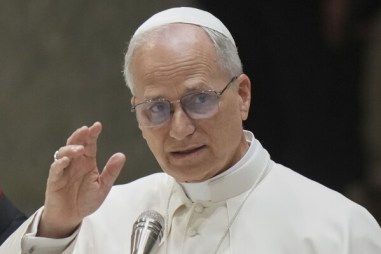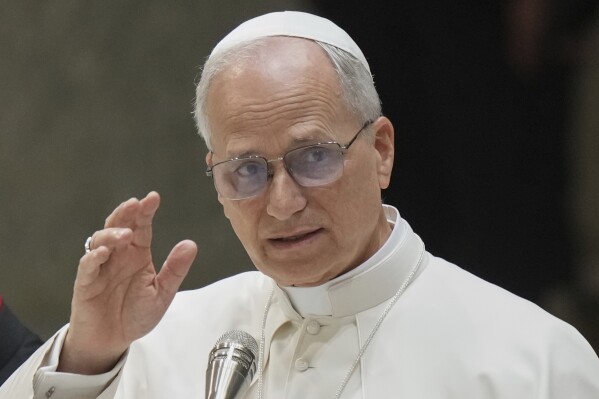

Gael Pardoen
Today’s post is the first part of a critique of Pope Leo XIV’s comments on LGBT issues during the recent interview with Elise Allen of Crux.
Dr. Gael Pardoen, PhD, is a theologian and Fellow of St John’s College, Durham University, whose current research explores belonging and the witness of LGBTQ+ Catholics in the life of the Church.
Part II will appear tomorrow.
Finally! Many of us had been holding our breath since the white smoke emerged from the Sistine Chapel earlier in the spring. What was the new pope going to say (if anything at all) about LGBTQ+ Catholics? Was he going to follow in the footsteps of his predecessor?
Pope Leo’s response to a question on LGBTQ+ issues in his first interview since his election shows that his following of Francis will be done cautiously. As a young gay Catholic theologian, I wish to share some hopes and concerns raised by his words, as well as the assurance that I will keep him in my prayers.
SIGNS OF HOPE
Two things stand out as particularly encouraging. First, it is no small matter that Pope Leo used the term “LGBT.” Pope Francis had already used the word “gay”, but this type of language remains far from obvious in many parts of the Church, as shown at the recent Synod. Naming people as they name themselves signals recognition and dignity and is coherent with Pope Leo’s call to treat all with the dignity of the children of God).
Second, Leo acknowledged that some Catholics hope the Church may one day recognise same-sex marriages. While he gave little reason to hope for change in “the near future”, he neither condemned nor expressed horror at the prospect. This change of tone is remarkable and should make us pause. It suggests that change, while distant, is not unthinkable—and that in the meantime, the invitation is for all of us to strive to be faithful disciples of Christ, bearing witness to our lives in both their limitations and their beauty.
WELCOMED AS “CHILDREN OF GOD” ?
 It was also encouraging to hear Pope Leo emphasise the importance of being a welcoming church. A (more) welcoming Church is at the heart of Francis’ legacy, and Leo’s words place him in that continuity. Yet, ‘welcome’ must be more than rhetorical; it must take flesh in pastoral practice. His commitment on this front will be decisive.
It was also encouraging to hear Pope Leo emphasise the importance of being a welcoming church. A (more) welcoming Church is at the heart of Francis’ legacy, and Leo’s words place him in that continuity. Yet, ‘welcome’ must be more than rhetorical; it must take flesh in pastoral practice. His commitment on this front will be decisive.
Leo added, “Everyone’s invited in, but I don’t invite a person in because they are or are not of any specific identity. I invite a person in because they are a son or daughter of God. You’re all welcome, and let’s get to know one another and respect one another.” In principle, this is true. Our deepest identity and inalienable dignity come from being made in the image of God and reborn in Christ in baptism . Yet, this does not negate everything else that makes us who we are. In fact, getting to know and respect one another requires being open to and acknowledging our distinctive identities if welcome is to be authentic, as theologian John Swinton reminds us. This acknowledgment is even more important when the Church has so often rejected and stigmatised people because of their sexuality, causing deep shame, psychological wounds, spiritual trauma and alienation. Here, explicit naming and affirmation of sexuality is an essential part of healing and the beginning of a healthy spiritual life and recovery of belonging. I am reminded of Bishop Francesco Savino’s courageous and prophetic words to an international gathering of LGBTQ+ Catholics in Rome on September 6, 2025, as part of this year’s Jubilee:
“What was the Jubilee? It was the year of the restitution of lands to those from whom they had been taken. The Jubilee was the forgiveness of debts and the freeing of the slaves and prisoners. The Jubilee was the time to liberate the oppressed and restore dignity to whom it has been denied. Brothers and sisters, I say with emotion: it is time to restore dignity to all, especially those to whom it has been denied.”
UNITY, POLARISATION AND THE CRY OF THE POOR
Leo further noted that LGBTQ+ questions are polarising, as the Synod revealed. While true, it is troubling when people themselves are framed as “a problem.” Most LGBTQ+ Catholics seek nothing more than to live ordinary lives of Christian discipleship—no more and no less.
What the language of “polarisation” often fails to account for is the imbalance of power. It can imply that “both sides” of the controversy enjoy the same level of stability, security, and agency when, in reality, the effects are not symmetrical. Inaction or silence causes very concrete harm on one side: spiritual and physical alienation from the Church and from loved ones, and in too many cases, despair that can lead to death. These realities cannot be brushed away in the name of unity.
Unity is a mark of the Church (“that they may all be one,” Jn 17:21), but it cannot be preserved at the expense of truth and justice. Christ warned that his message would also bring division (Mt 10:34–36). As Christian nationalism spreads under the guise of defending “Christian values” and identity, speaking truth, defending the vulnerable—the unborn, the disabled, the elderly, the poor, the foreigner—and affirming the dignity and equality of LGBT people and of women as well as racial justice will inevitably become more polarising. But that cannot mean silence, for Christ also said: “I was hungry and you gave me nothing to eat, I was thirsty and you gave me nothing to drink’ (Matt 25: 42)
—Gael Pardoen, Durham University, September 25, 2025
Tomorrow’s post continues the examination by challenging the idea that LGBTQ+ matters are merely about sex, asking what an authentic Catholic defense of the family might mean today, and what we might expect in the future regarding matters LGBTQ+ in the church.
Related
